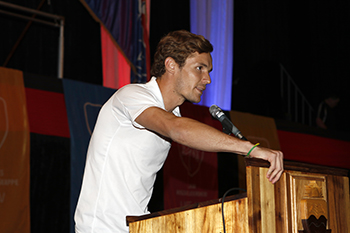Latest News Archive
Please select Category, Year, and then Month to display items
09 December 2020
|
Story UFS entral academic advising team
|
Photo Pixabay

It wasn’t easy, but we all got to this point because we stayed calm and made the effort to learn on even when it was difficult.
The University of the Free State (UFS) has remained committed to supporting you in every way possible, and as you prepare for the final assessments, remember to access the support tools you will need in order to successfully complete the 2020 academic year: https://www.ufs.ac.za/toolsforsuccess
Main exams are running from 30 November to 19 December 2020
All of the best, and break a pen in your upcoming final assessments. For those of you who will be graduating, we cannot wait to see you in that graduation attire; and those who still have some way to go, we cannot wait to serve you again in 2021 as we continue the pursuit of academic success!
Below are five main study tips that you can use for final assessment success:
1. Set a realistic study schedule
You might think that studying for eight hours straight for four days before the exam, will help you get through the work in time. See final edition of the #UFSLearnOn for more information.
2. Structure and organise your work
If your notes are organised, it is also easier for your brain to recall information, even when you become nervous during exams.
3. Practise with an old exam/semester test paper
Practice makes perfect, and although the final assessments might look different in how they are administered, it will still help to practise using old tests and exams.
4. Adapt your strategies to the content
What works for one module or even one learning outcome, might not be effective for another. You need to continually adapt your note-taking and study approaches. See #UFSLearnOn final edition for different study methods.
5. Healthy body, healthy mind
Your brain needs optimal care to perform at its best, and getting physically active (even if it is by jumping in one spot if space is limited) forces your body to release neurotransmitters responsible for positive emotions, which assist in retaining information in your memory …
Download the final edition of #UFSLearnOn that points you towards the resources you’ll need to ace your final assessments and end 2020 off on a high note!
I don’t see myself as a star, says Wayde
2016-09-20

The achievements of Wayde van Niekerk and his
fellow Kovsie athlete, Rynardt van Rensburg,
at the Olympic Games, were celebrated during
a celebration ceremony for them on
15 September 2016 in the Callie Human Centre.
Photo: Johan Roux
The environment surrounding him has changed a lot over the past few weeks, but Wayde van Niekerk doesn’t see himself as superstar. The 400 m Olympic champion is embracing being back home and is feeling the love of the Kovsie family that helped him reach great heights.
“I see this (the Bloemfontein Campus) as a place where I can find peace,” the University of the Free State (UFS) athlete said at a celebration ceremony on 15 September 2016 for him and fellow Olympian, Rynardt van Rensburg. The event celebrated their achievements after participation in the Olympic Games in Rio de Janeiro, Brazil. Their coaches, Tannie Ans Botha and Derek van Rensburg, were also honoured.
Van Niekerk looks ahead
“I am always excited to get back home,” Van Niekerk said. Everybody who means something to him is in Bloemfontein and on this campus. “I thank you for believing in me. I am only 24 years old and still have quite a few years left to keep on doing what I do.” He also conducted the official opening of the new KovsieFit gymnasium in the Callie Human Centre.
According to Prof Nicky Morgan, acting Vice-Chancellor and Rector, the attendees had “Wayde fever”. “We can’t really say thank you enough – at least for the association we have had with you (Van Niekerk) over the years.”
Rynardt didn’t expect best in Rio
“I see this (the Bloemfontein Campus)
as a place where I can find peace.”
Van Rensburg reached the semi-finals in Rio and ran a personal best of 1:45.33 in the 800 m. “If we don’t have support, we won’t be able to do this,” he said.
Although his form was improving prior to the Olympics, he didn’t expect to run a personal best. “My dad (and coach) kept believing in me and telling me it is possible to do.”